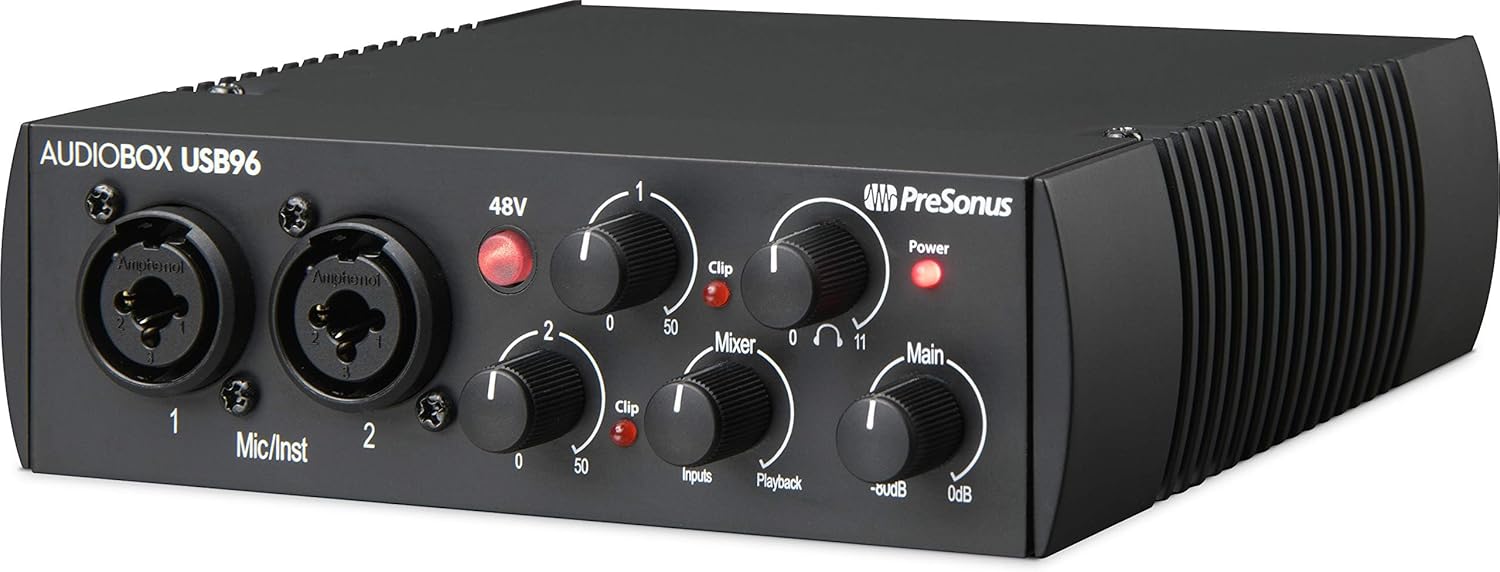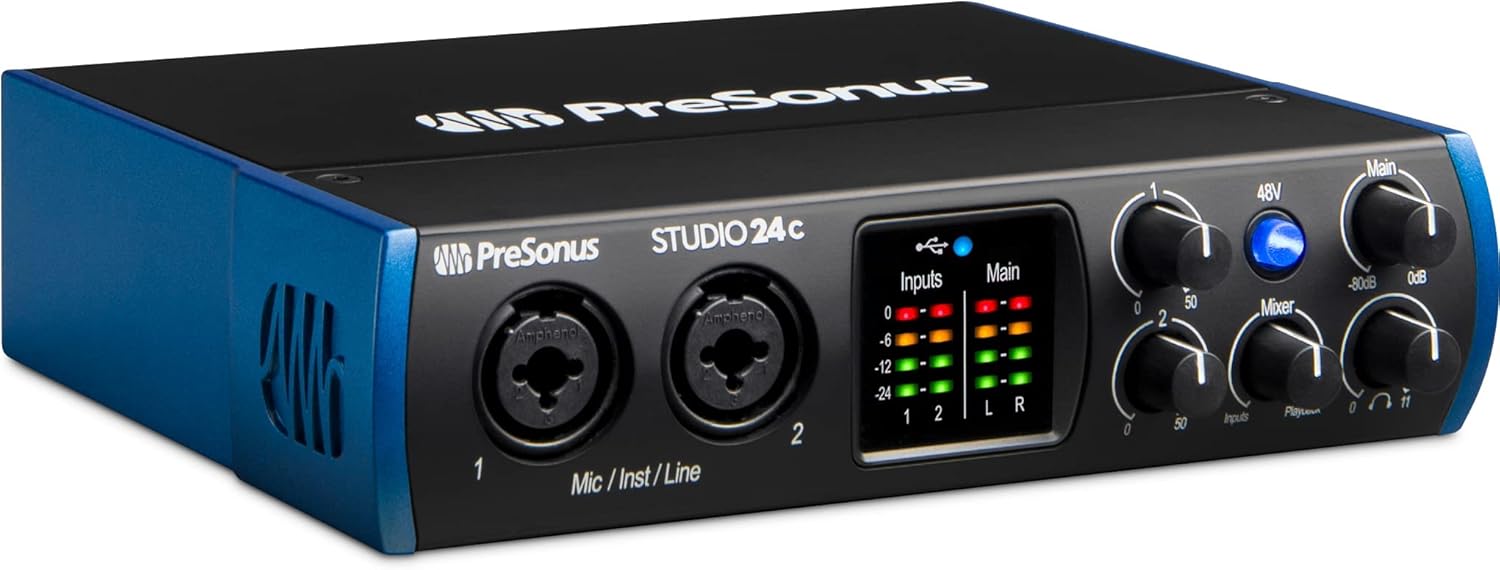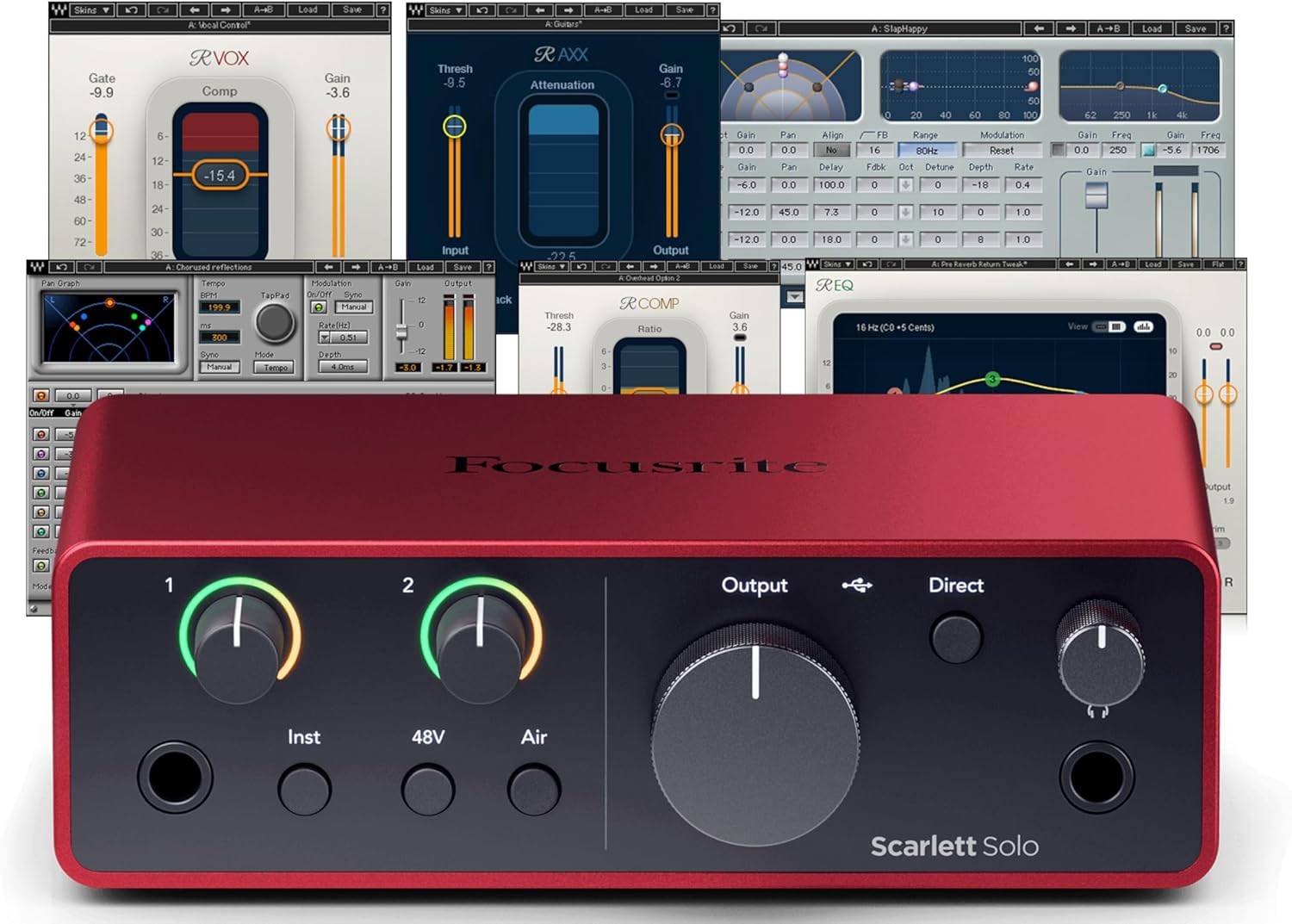Here’s an overview of the Best Audio Interfaces that we’ll explore today:
Audio interfaces are essential tools for musicians, podcasters, and home studio enthusiasts, providing the bridge between analog and digital audio. Whether you’re recording vocals, instruments, or streaming content, choosing the right audio interface can significantly impact sound quality and workflow efficiency. In this review, we tested five popular models priced between $69.00 and $109.99, evaluating their features, performance, and user experience. Our methodology included hands-on testing, comparing technical specifications, and assessing real-world usability to help consumers make informed decisions.
1. Focusrite Scarlett Solo 3rd Gen USB Audio Interface
- Brand: Focusrite
- Manufacturer: Focusrite
The Focusrite Scarlett Solo 3rd Gen is a premium audio interface designed for musicians, podcasters, and producers seeking high-fidelity studio-quality recordings. It boasts impressive mic preamps with a switchable Air mode for enhanced clarity, as well as high-performance converters capable of 24-bit/192kHz resolution. The inclusion of Gain Halos simplifies input monitoring, and the bundled software suite (Pro Tools Intro+, Ableton Live Lite, and Hitmaker Expansion) provides everything needed to start recording immediately.
In practice, the Scarlett Solo 3rd Gen delivers exceptional audio clarity and low noise, making it ideal for recording vocals and acoustic instruments. The compact design and USB-C connectivity ensure seamless integration with modern devices. However, its two-channel limitation may be restrictive for users requiring more inputs for multi-track recording. Overall, it’s an excellent choice for solo musicians and podcasters who prioritize sound quality and ease of use.
Pros
- High-quality mic preamps with Air mode
- 24-bit/192kHz resolution for studio-grade recordings
- Gain Halos for intuitive input monitoring
- Comprehensive software bundle included
- Low-noise balanced outputs for clean audio playback
Cons
- Limited to two input channels
- Slightly higher price compared to budget options
2. M-Audio M-Track Duo – USB Audio Interface for Recording
- Brand: M-Audio
- Manufacturer: M-Audio
The M-Audio M-Track Duo is a budget-friendly audio interface that offers versatility for recording, streaming, and podcasting. With dual XLR/line/instrument inputs and phantom power, it accommodates a variety of microphones and instruments. It provides 48kHz audio resolution and includes the MPC Beats software suite, giving users access to essential production tools.
During testing, the M-Track Duo performed well for basic recording tasks, delivering clear audio with minimal latency. Its Crystal Preamps ensure decent sound quality for the price, making it suitable for hobbyists and beginners. However, the 48kHz resolution is lower than competitors offering 96kHz or 192kHz, and the build quality feels less robust compared to higher-end models. It’s a great entry-level option for users on a tight budget.
Pros
- Affordable price point
- Versatile inputs with phantom power
- Compact and portable design
- Includes MPC Beats software suite
- Zero-latency monitoring via USB/Direct switch
Cons
- Limited to 48kHz audio resolution
- Build quality feels less durable
3. PreSonus AudioBox 96 25th Anniversary USB Audio Interface with Studio One Artist DAW Recording Software
- Brand: PreSonus
- Manufacturer: PreSonus
The PreSonus AudioBox 96 is a value-packed two-channel USB interface offering 24-bit/96kHz recording quality. It features Class-A mic preamps, MIDI I/O, and balanced outputs, making it a versatile choice for portable recording setups. The included Studio One Artist DAW and Studio Magic Plug-In suite provide over $1000 worth of software, adding significant value.
In our tests, the AudioBox 96 delivered reliable performance with clean audio and low latency. The MIDI I/O is a standout feature for users incorporating external hardware like keyboards or drum machines. However, the global phantom power setting may be inconvenient for users mixing condenser and dynamic microphones. Its slightly bulkier design compared to competitors may also deter users seeking ultra-portability.
Pros
- 24-bit/96kHz audio resolution
- Class-A mic preamps for great sound quality
- MIDI I/O for external hardware integration
- Comes with Studio One Artist DAW and Studio Magic Plug-In suite
- Balanced outputs for professional monitoring
Cons
- Global phantom power may limit microphone flexibility
- Bulkier design compared to competitors
4. PreSonus Studio 24c 2×2
- Brand: PreSonus
- Manufacturer: PreSonus
The PreSonus Studio 24c is a compact and feature-rich audio interface offering 24-bit/192kHz recording quality. It includes two XMAX-L mic preamps, MIDI I/O, and balanced outputs, making it suitable for musicians and producers. The front-panel controls and LED level meters provide intuitive operation, while the bundled Studio One 6 Artist Edition software ensures a seamless recording experience.
The Studio 24c impressed us with its high-quality audio performance and low-latency monitoring. Its USB-C connectivity ensures compatibility with modern systems, and the included cables simplify setup. While it’s slightly more expensive than some competitors, its robust build quality and advanced features justify the price. It’s an excellent choice for users seeking professional-grade audio in a compact package.
Pros
- 24-bit/192kHz audio resolution
- XMAX-L mic preamps for detailed sound
- MIDI I/O for hardware integration
- Compact and durable design
- Bundled Studio One 6 Artist Edition software
Cons
- Higher price point compared to some competitors
- Limited to two input channels
5. AudioDeluxe Focusrite Scarlett Solo (4th Gen) USB Audio Interface
- Brand: AudioDeluxe
- Manufacturer: AudioDeluxe
The AudioDeluxe Focusrite Scarlett Solo (4th Gen) builds on the Scarlett Solo legacy with upgraded features like a 120dB dynamic range and ultra-low-noise mic preamps. Exclusive to this bundle is the Waves Musicians 2 plugin suite, which includes six indispensable audio plugins for professional-grade production. The included software suite (Ableton Live Lite, Avid Pro Tools Intro+, and Hitmaker Expansion) further enhances its value.
The Scarlett Solo (4th Gen) delivered exceptional performance in our tests, producing clean recordings with impressive dynamic range. The Hi-Z instrument input worked seamlessly with amp simulators, making it ideal for guitarists. While the bundled plugins are a significant bonus, the interface remains limited to two channels, which may not suffice for users requiring more inputs. It’s a top-tier choice for solo producers and musicians seeking premium sound quality.
Pros
- 120dB dynamic range for pristine audio
- Ultra-low-noise mic preamps
- Exclusive Waves Musicians 2 plugin bundle
- Hi-Z instrument input for guitar recording
- Comprehensive software suite included
Cons
- Limited to two input channels
- Higher price compared to budget options
Frequently Asked Questions
We’ve compiled answers to the most common questions about audio interfacess to help you make an informed decision.
Conclusion
Each audio interface offers unique strengths and caters to different user needs.
For premium audio quality, the Focusrite Scarlett Solo models are unmatched.
Beginners should consider the M-Audio M-Track Duo, while PreSonus models excel in versatility and professional features. Evaluate your requirements carefully to choose the best fit..





